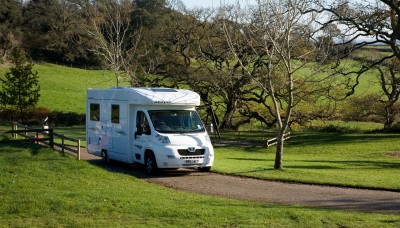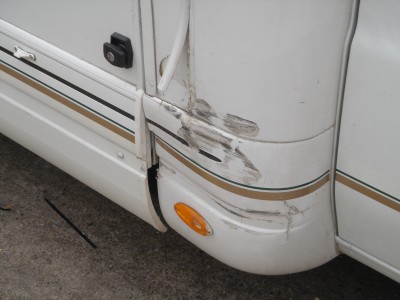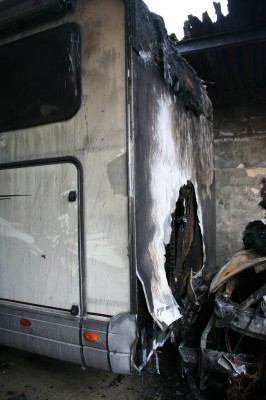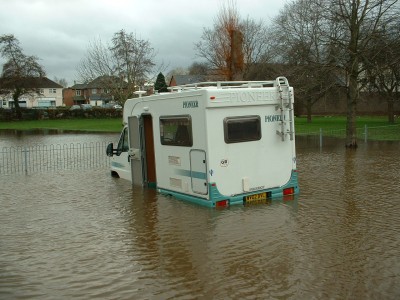Spring is in many ways the perfect time of year to go motorhoming. Whether you plan on travelling here in the UK or somewhere further afield in Europe, the mild weather and school holidays make April and May the obvious choice for those looking to get away.

It may surprise you to learn then, that we often see a rise in claims at this time of year. The increase isn’t huge, but it does highlight how important it is to take extra care over the next few months.
There are a number of reasons why a spike in claims may occur; to explain these in more detail, let’s take a closer look at the most common motorhome claims recorded in spring and what you might be able to do to prevent them.
Accidental damage claims
Accidental damage claims are without doubt the most common and widespread claims amongst Caravan Guard customers in spring. In fact, our statistics show that you’re twice as likely to make a claim of this kind between March and May, than you are between December and February.

So what types of claims fall under this category?
Internal spills, breakages, smashed windows and cracked worktop surfaces are all common accidental damage claims. We’ve also heard from customers who’ve accidentally damaged the exterior their motorhome when boarding a ferry over the spring bank holiday. Manoeuvring claims are high especially as owners move out of or into storage spaces.
On average we see a 27% rise in accidental damage claims between April and May. The likely reason for this is simply because it’s a time where there is a higher usage of motorhomes.
How can you try to prevent such mishaps occurring?
Before beginning your trip, make sure bottles, jars and other heavy items in cupboards or in your washroom are secure so they don’t fall in transit. To prevent manoeuvring mishaps it’s always worth taking a little extra time when squeezing through tight spaces, getting a family member or friend to watch you out, or even investing in a motorhome reversing camera or sensor.
Fire
Statistically speaking, fire is one of the least common claims amongst our motorhome policyholders – but that’s not to say it doesn’t happen. We see just a handful of fire claims each year, but our claim records show that in March 2011, claims for fires were more than double the average of previous years. Furthermore, in May 2012 we saw a further increase.
Why are fire claims more common in spring?
It’s at this time of year when you may start using your BBQ and other appliances around your motorhome. All this adds up to an increase in fire risk.

How can you try to prevent fires?
To help reduce the risk of a fire starting, always ensure a lit BBQ is placed at least 2 metres away from your motorhome and on firm ground; never cook inside an awning. As for fire risks on the inside of your motorhome, a thorough habitation service should have picked up any faults. And then when on site it’s just a case of common sense ensuring appliances such as fires are turned off before bedtime and cookers turned off as soon as you’ve finished cooking.
It’s well worth pressing the tester button on your motorhome’s smoke alarm to ensure its battery is still in a healthy condition so that it will give you an early alert if anything does go wrong.
For further advice and tips on how to protect against fire, this recent guide as all the information you need.
Road accidents
Between March and May, our claims reports do show a sharp, sudden increase in numbers of road accidents. The Easter and May bank holidays are proving increasingly popular with families opting for a ‘staycation’ here in the UK, so motorhomers can expect congestion on the roads which may expose vehicles to greater risk of road traffic accidents.
What types of scenarios are we talking about?
Road accidents can strike at any time, but some can be prevented with careful driving, regular vehicle maintenance checks and good road awareness. Although relatively uncommon, claims of this sort can involve tyre blowouts.

What can I do to reduce the chance of a road accident?
As well as spending time carefully loading your motorhome to ensure more vehicle stability when travelling, Motorhome tyre maintenance is always something we encourage, it’s well worth checking pressures to ensure correct inflation and for signs of tyre damage especially before every long trip and if your motorhome has been stood still in its storage location for a few months.
If you’re ever involved in a road traffic accident and you are unsure what immediate steps to take, familiarise yourself with our guide on what to do in the event of a motorhome accident.
Theft
Theft claim patterns are far more sporadic than most other claims. Break-ins, theft and attempted theft are reported throughout the year, but statistically, there tends to be a drop in claims in the summer months. Before this though, in March, April and May we regularly see higher than average theft claim rates.
How can I prevent theft?
We advise customers to pay extra attention to the whereabouts of keys and high-value items inside the motorhome. Keeping both out of sight and secure will reduce risks and make it difficult for thieves to target your motorhome. For hints on how to prevent your keys being swiped, take a look at this essential guide.
To prevent theft of the motorhome itself, we’d always encourage owners to activate any security they have fitted, such as alarms and tracking devices, whenever leaving the motorhome unattended, even if just popping to the campsite shop for a few minutes.
Weather-related claims
Given the somewhat unpredictable nature of the Great British weather, bear in mind that flooding, storms and strong winds can also cause serious damage to your motorhome at this time of year. If the last few years are anything to go by, you can never completely rule out torrential weather in Spring!
How can I outsmart the weather?
If you’re staying on an English campsite near to a river, and heavy rain is forecast, it may be worth checking the Environment Agency’s flood warning website for flood alerts in the area – similar websites can help for Scottish and European flood warnings. If floods are predicted it’s worth speaking to the campsite operator to determine if you and your motorhome are at risk – a precaution such as moving to a pitch further away from the source of water or onto higher ground might make sense.
If high winds are forecast, it’s worth taking down awnings – it’s not just the risk of the awning getting ripped but flying awning polls often dent, scratch and even puncture a motorhome’s bodywork.

Be extra cautious this Spring
If you’re preparing your motorhome for a getaway over the Easter and May bank holidays, take a moment to read our preparing your motorhome for spring guide before you travel.
For advice on how to avoid common bank holiday mishaps, see here for top tips.
Have you ever fallen victim to a Spring claim?
Upload a comment and share your story below.


I have your policy for my motor home.
Please explain what the 30% refers to.
Is it regarding chipping my engine?
Hi Peter,
If you could provide a bit more information on this, I’d be happy to look into it for you. What 30% are you referring to exactly? Many thanks
Lucie